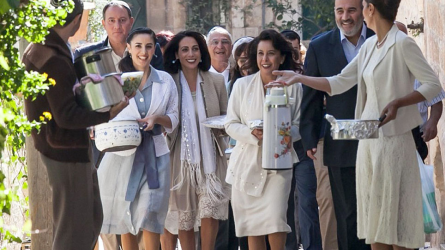Although I joke about it sometimes because of the (relatively) few number of foreign films we see, it is undoubtedly true that a nation’s films reflect (as well as shape) its character. So, while my common refrain of “I know, right? French!“ is somewhat overplayed, when you see a foreign film that totally plays into your notions of that country’s art, there’s a kind of satisfaction there. (Unless it’s Germany and Toni Erdmann, ’cause, dude, what the heck is wrong with German people?)

I suppose the scary thing here is how FEW countries a movie with this shot could feasibly be from.
Bonus if it’s Israel, because my notions there include a certain level of quality and an overall sense of humaneness.
Which brings us to the #1 (?) Israeli film of the year, The Women’s Balcony. This is the story of women in the temple who are worshiping on the balcony over the main area (where the men are) during a bar mitzvah when it collapses, injuring the rabbi’s wife and sending him into a funk where he is no longer able to perform his duties. His synagogue condemned and his flock (wait, Jews aren’t flocks, are they?) are stranded without a place of worship, and must navigate the difficulties of raising money for building repairs, a new Torah and, significantly, a new balcony.
In classic Israeli style, the opening scenes show the humanity of the dilemma to come with a small, humorous tableau. As it is the Sabbath, these conservative Jews may not work—including turning on the coffee maker. So, before sundown, they set up the coffee maker, thus allowing them to have the vital beverage without breaking the Sabbath. Before the bar mitzvah gets rolling, however, one of the grandchildren runs into the area with the coffee maker and, fascinated by lit buttons as all children are, he turns it off. His grandmother scolds him for breaking the Sabbath but then realizes that their celebration will be without coffee if the machine doesn’t get back on somehow.
First she tries coaxing the boy into turning back on, just in case he’s, y’know, still curious about buttons, but the lad is terrified of sinning again and refuses. Now what? (She turns it back on, setting up her character and the primary conflict for the rest of the film.) This setup is classic in another way: It’s very light-hearted, and it’s followed by a tragedy. The best (and most characteristic) Israeli cinema strikes a light tone without shying away from tragedy.
Anyway, the congregation struggles with rebuilding until they find Rabbi David, a young, energetic, devout conservative who helps them fulfill their requirements (they need some sort of quorum for services, it seems) while also navigating the tricky building permit laws. The catch is that David is considerably more conservative than the congregation, and his beliefs about women are particularly retrograde. (This is a peculiarity of very conservative religious groups: They extol women’s virtues in sermons—while oppressing them for their “sinfulness” in practice.) So, while talking on the one hand to the men about how women don’t need to study the Torah because they contain the Torah, he on the other hand chastises the women directly for not wearing the tichel (like a hijab) to cover their hair, among their many other sins.

He seems like such a NICE boy.
One priceless sequence has each of these conservative (but loosely so) men bringing home a scarf for his wife to wear.
What’s interesting is how many of the women buy into the Rabbi’s outlook, and their reasons for doing so. But when they all get together and raise the money to get The Women’s Balcony repaired, the Rabbi machinates to put that money into the Torah and leave the women in a virtual closet where they can see nothing of the action in the main temple area.
This is great stuff. At least, I think it is: How Man reconciles his behavior with what he believes his religion requires and what his community requires and what his conscience requires—this is a real struggle. It’s the sort of thing Israelis do very well. Americans have never been great at it, though certainly there have been moments, such as with Friendly Persuasion or (to a much lesser degree) Witness.
Religion, community, conscience—and almost always, spouse. We see a variety of relationships, with our main characters having a particularly tender and respectful bond, with the husband being put into a terrible situation as he must choose between wife and God—or at least, what one Rabbi says God wants. A little vignette with the husband having a particular fondness for a little boy who likes to come around his spice shop highlights the struggle beautifully, as he worries if his own conservatism might cause a conflict with the little boy in the boy’s (non-conservative) community.
This being an Israeli film, we’re given a true kind of tolerance. The movie doesn’t really excoriate the Rabbi, even when he acts badly, nor does it look unkindly on the heroine and her husband, nor does it look on those who embrace their newfound conservatism (even when there’s hypocrisy behind it). People are people, it says. They have flaws, sometimes serious ones, but you love them anyway, and you tolerate them as best and for as long as you can.
The Boy liked it, though he didn’t find it as moving as I did. I, of course, loved it, and could easily see why it was so popular in Israel.

Coffee! A fundamental part of any religion.
